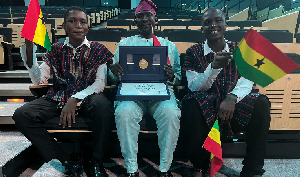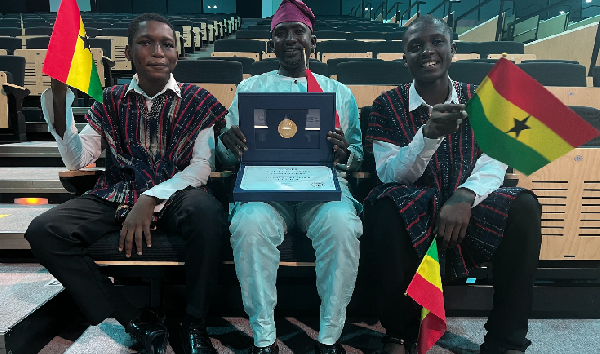 The team was presented with a prize money of USD 150,000 to support their aquaponics project
The team was presented with a prize money of USD 150,000 to support their aquaponics project
Sakafia Islamic Senior High School’s aquaponics initiative has won this year’s Zayed Sustainability Prize Global High Schools award.
The prize money of USD 150,000 will support the students in expanding their aquaponics project – a unique farming method where fish and plants are cultivated together in a symbiotic environment, mutually benefiting from each other’s presence.
Master Alhassan Adam, one of the students involved in the implementation of the technology at the school based in the Ashanti Region, received the prize from Dr. Sultan Ahmed Al Jaber, Minister of Industry and Advanced Technology, at the opening of the United Arab Emirates’ Sustainability Week in Abu Dhabi.
The prize fund comes from the Abu Dhabi Government to honour and continue the sustainability and humanitarian legacy of the UAE’s founding father, the late Sheikh Zayed bin Sultan Al Nahyan.
Other winners included Nafarm Foods, a Nigerian firm that develops scalable hybrid solar food dryers that preserve food in the food category.
The rest are OpenMap Development Tanzania, a Tanzanian-based firm that deploys a flood management solution – Climate Action; Palki Motors, an organization from Bangladesh that manufactures local, low-cost electric cars with solar – energy category; and Presidential School in Tashkent, a public school in Uzbekistan with 165 students, which aims to install rainwater harvesting and filtration systems in 150 schools to provide clean water – water category.
Sustainability week is vital for bringing together global leaders, pioneers, and experts to address pressing sustainability challenges, develop strategic frameworks, and craft innovative solutions to ensure a prosperous future for all.
Dr. Jaber commended all winners and urged them to enhance and upscale their projects.
He said sustainability was a cornerstone of the nation’s strategies as the UAE continued its unwavering efforts to harness resources and capabilities to drive global sustainable economic and social development.
Dr. Jaber, the Chairman of Masdar, announced the development of the world’s largest single-site solar power plant and a globally pioneering desalination facility.
Master Adam told the Ghana News Agency that the innovation that won the award was developed from a regular group class project, which required them to practicalize a sustainability action with low carbon emissions.
He said the class project, through brainstorming, research, and consultation with technical officers, saw the cultivation of fish and vegetables, including carrots, lettuce, and green pepper, supplied to the school’s kitchen.
“We later heard there is an award scheme and applied. This is a fantastic milestone for our studies and future,” he added.
They would forge a collaboration with the community and expand the project by cultivating more crops and farming more fish.
The Zayed Sustainability Prize’s jury elected the 33 finalists from 5,980 entries received across six categories: Health, Food, Energy, Water, Climate Action, and Global High Schools – a 15 percent increase in submissions over last year.
The jury said this year’s cycle received an unprecedented number of submissions, with notable participation from the Global South and youth.
“In fact, this year’s submissions reflect the three megatrends shaping our future, namely the rise of the Global South, the pace of the energy transition, and the growth of AI.”


